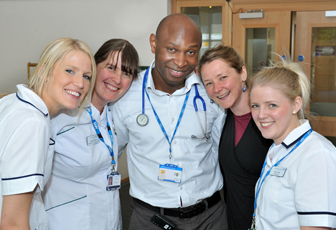South Warwickshire Audiology: Specialist Hearing Clinic
Specialist Hearing Clinic
The Specialist Hearing Clinic is designed for adults who have complex hearing losses or co-existing conditions. The clinic is led by senior staff with expertise in specialist diagnostic testing, treatments and care to support you with the problems you are having with your hearing.
This clinic allows long appointment times, advanced testing and different treatment strategies from our other pathways.
Referral
There are specific criteria for this clinic. These include:
| Hearing Loss | Co-existing or confounding conditions |
|
|
If you consider you fall within this and would like to be referred to the clinic then either seek a referral from your GP if you currently do not have a hearing aid from South Warwickshire University NHS Foundation Trust or come to see our team through a booked repair appointment for a referral.
Appointments
The clinic is held in Warwick Hospital only and the patient care will be managed by a Senior Audiologist who specialises in complex hearing needs. Each patient is asked about their medical history (focusing on their ears, but relating to anything which may be linked to this assessment). We spend time to identify the social and emotional impacts of their hearing difficulties and with get input from each patient, to design an individualised care package.
A routine hearing assessment will be carried out at the appointment. The Audiologist may choose to carry out one or more of the following advance tests if they feel it would enhance the individualised care package:
- Speech Perception tests - also commonly known as a speech discrimination test or speech audiometry test, involves testing your ability to hear words. The words may be played headphones or a speaker, or spoken by the tester. Sometimes, you are asked to listen to words while there is a controlled level of background noise. This test might also test your lip-reading skills by using a video of someone saying the sentences. These tests include:
- Speech Audiometry
- Speech in noise
- Sentence testing and lip-reading evaluation
- Oto Acoustic Emissions - The test aims to identify whether the tiny hair cells in your inner ear are functioning normally by playing a sound into your ear and measuring the response.
- Cochlear dead region testing, using Threshold noise equalising (TEN) test - This test will try and find if parts of your inner ear (which are responsible for you hearing) are not working. These are known as cochlear dead regions. If you have dead regions it can affect how clearly you can hear.
- Reflex threshold testing - This test measures when a muscle contracts in your middle ear and tests the nerve pathways in your ears. This test can be useful alongside other tests to help determine the cause of some hearing losses.
- Visual Speech mapping – a measurement used alongside other tests to check that your hearing aid is giving you the right amount of volume for different sounds and situations - it involves placing a very small soft tube into your ear and playing different sounds through a speaker while wearing your hearing aid.
After an assessment an individualised care package will be agreed with the patient which may include one or more of the following management options:
- Counselling around adjustment to hearing loss
- Advice and self-management support on the chosen treatment
- Hearing aid management and often an upgrade in technology
- Assistive listening device options (other equipment which can be helpful in specific situations). You may find the following leaflet of use.
- Communication tactics and self-help tips. Covering including family and friends in your communication needs, the impact of the environment and assertiveness. You may find the following leaflet of use.
- A home rehabilitation programme (which we provide details of in the clinic)
- Access to a peer support volunteer, who can listen, relate and advise you around the experience of hearing loss. The volunteer shares their knowledge, experience and provides emotional which can be really valuable. Peers can speak about what worked for them, talk about coping strategies and provide empathy that people who do not have that direct experience may not be able to.
- Signposting to other agencies, for example lip-reading, charities who support people with hearing loss and places where people can meet others in a similar situation they are in
- Local lip-reading class information can be found here.
- Referrals to other departments for other treatments such as::
- Cochlear Implants - A cochlear implant is a surgically implanted electronic device that provides a sense of sound to a person who has a severe or profound hearing loss. For more information please click here.
- Bone Conduction Hearing Devices - A bone conduction hearing device is an alternative to a regular hearing aid for those with problems in their outer or middle ears. It transfers sound by bone vibration directly to the cochlea, bypassing the outer and the middle ear. This means it is useful for conductive and mixed hearing losses. For more information please click here.
- Ear Nose & Throat Department.







